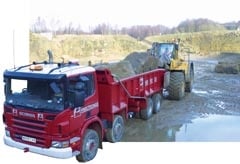Gritstone block from Brinscall Quarry in Lancashire was once appreciated across a wide geographical area. Now that the Armstrong Group have bought the quarry they aim to re-establish that geographical spread.
When the Armstrong Group bought Brinscall Quarry in Lancashire from Hanson around 18 months ago and started supplying Block Gritstone, a new heavyweight had entered the UK stone industry.
While most of the aggregates industry was desperately cutting back to bring supply into line with recession-hit demand, the £12million Bolton-based aggregates, recycling and waste management group owned and run by David Armstrong were in a position to take advantage of Heidelberg-owned Hanson’s decision to dispose of some of their assets.
Armstrongs already operated an aggregates quarry but Brinscall Quarry represented their introduction to dimensional stone.
Their newly acquired quarry in Chorley, Lancashire, is the source of much admired fine-grained buff to buff-brown Gritstone blocks available in sizes from four to 20 tonnes that are suitable for just about any masonry use and paving.
There is, however, a lot of stone above the block that is being crushed for aggregates – and currently there are a lot more loads of aggregate leaving the quarry each week than there is block destined for the dimensional stone market.
The blocks are hand drilled and trimmed using plugs and feathers, or, for more stubborn blocks, Nonex, a low-power charge that splits the stone without causing micro-cracking.
For now, at least, splitting the blocks is as far as they go, having decided not to get into sawing or cropping. They have their own fleet of 50 vehicles, so are geared up to deliver the block, although customers are also welcome to collect it themselves.
The quarry was originally opened about 100 years ago to satisfy demand from local builders. The block can be seen in a number of local properties looking as good now as the day they were built. However, Brinscall Gritstone Block has gone much further afield in the course of its history and contributed significantly to the building of the North West’s motorway system and as well some impressive, prominent and historical buildings.
Such was the demand for the high quality Brinscall Block stone that at one time the quarry even had a railhead to help satisfy the demand. Nowadays distribution methods have changed and although there are no plans to re-establish a rail link, Armstrongs would like to re-establish the sales of quality Brinscall Block stone to a wide geographical area and consider it an interesting enough market to warrant promoting the stone to it.
The local market is still important, though, and Armstrongs’ Quarry Manager, Keven Caine, says: “The longevity of the quarry establishes the provenance of the stone, which made it an easy choice for Lancashire County Council, for example, when they wanted a feature stone for a local park recently. With not too much competition within a 30-40-mile radius, as well as having an attractive stone for a wider audience we believe that we can be strong players in niche markets.”
Over the past 18 months, Armstrongs have made a considerable investment in equipment at Brinscall quarry, including Volvo loading shovels, excavators and dumptrucks, Pegson jaw and cone crushers and a four way split Powerscreen for aggregate production. Armstrongs say that they are in it for the long haul as there are certainly plenty of consented reserves left in the quarry – enough to last for another 40 years.
Purchasing Brinscall quarry was making the most of an opportunity offered by the recession, and it is not the only asset Armstrongs have recently acquired. There latest acquisition is Montcliff Quarry on the outskirts of Bolton, another gritstone quarry to add to their portfolio.
The purchase of assets that have become available at favourable prices does not mean Armstrongs have not been affected by the recession. “Anyone remotely connected to the building industry is suffering a bit,” says David Armstrong. “We reacted to the downturn quickly, took stock, tightened the belt and now we’re riding the storm. It’s difficult times for all, and it’s not over yet. It’s true we’re seeing growth as a company, but the message I give from the top is to keep tightening the belt.”
The volume of block Armstrongs are selling pales into insignificance beside the 1,000-to-2,000tonnes of aggregate the Group sells each day. But, of course, the block has a much higher value and has already taken Armstrongs into the export market, with some of their Brinscall Gritstone Block going to Germany. The weakness of the pound currently makes the stone an even more attractive proposition than usual for overseas buyers as well as helping it to compete against imports in the home market.
“Maybe I am biased, but I don’t think you can beat the quality of English stone,” says Keven. “In-fact, I am sure that if Carlsberg were into quarrying they would be supplying Brinscall Gritstone… probably.”

